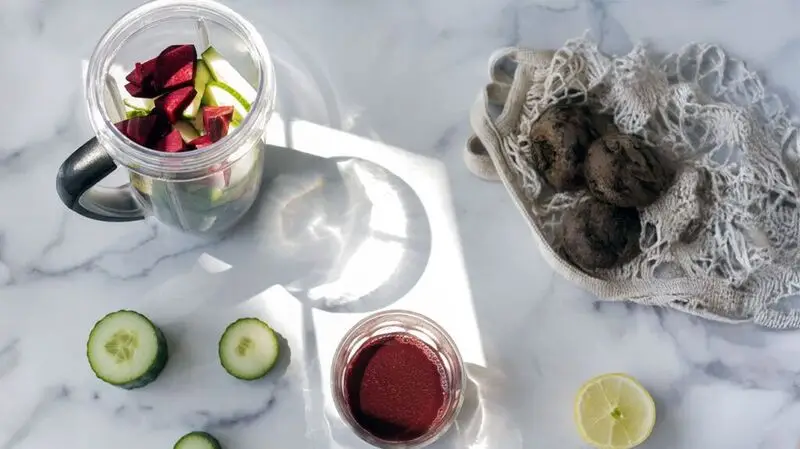
- Short juice cleanses are increasingly popular and are heavily marketed with claims that they help remove toxins and aid digestion and weight loss.
- They involve consuming only fruit and vegetable juices for between three and seven days.
- However, there is little scientific evidence of any health benefits, and a new study has suggested that, rather than being beneficial, they may actually be harmful to health.
- The small study found that only three days of a juice cleanse appears to alter a person’s microbiome, increasing inflammatory bacteria and decreasing those that are beneficial to health.
A juice cleanse involves consuming only fruit and vegetable juices for a short period of time, usually between 3 and 7 days. People can make their own juices from fresh or frozen fruits and vegetables or buy some of the many commercially available varieties, often at high cost.
Advocates claim that a juice cleanse can have many health benefits, including:
- Removing toxins from a person’s body
- Promoting weight loss
- Altering gut bacteria by encouraging those associated with weight loss.
However, most evidence of benefits is anecdotal, and there are also potential harms from following a juice-only diet. The
Now, a study has found that even if you make your own fruit and vegetable juices, going on a juice-only diet for as little as three days could be harmful to your health.
The study, which is published in MDPI Nutrients, found that, following a 3-day juice cleanse, people’s oral microbiome changed, with increased inflammatory bacteria and fewer beneficial bacteria found on testing.
Megan Mehnert, a UK Registered Dietician in Bristol, UK, urged that the findings should be viewed with caution:
“It is difficult to draw meaningful conclusions from the study; as the researchers suggested, the sample size was small, intervention was short, and [the] population group is not representative of the wider population,” she told Medical News Today.
At the start of the 21-day study, the 14 participants (who had a mean age of 22.7 years) underwent a 3-day elimination diet, during which time they ate organic fresh fruits, vegetables, gluten-free whole grains, and eggs, as well as drinking 8 glasses of water a day. Researchers told them to avoid caffeine, alcohol, sugar, processed foods, dairy, red meat and gluten.
All participants were healthy and did not take regular medications.
Following the elimination diet, the researchers divided them randomly into 3 groups, each of which followed an intervention diet for 3 days:
- Group 1 (2 males and 3 females) followed a ‘juice fast’, taking in 800-900 Kcal per day of cold-pressed fruit and vegetable juice.
- Group 2 (2 males and 2 females) ate a regular diet without energy restrictions, plus cold-pressed juices.
- Group 3 (3 males and 2 females) ate a plant-based, whole food diet, giving them 800-900 Kcal per day.
Participants then followed a 3-day reintroduction diet, after which they returned to their normal diets.
The researchers collected saliva, cheek, and fecal samples at the start of the study, after the elimination diet, at the end of the intervention diets, and 14 days later, at the end of the study. They extracted DNA to identify the bacteria in the samples.
On the elimination diet, the researchers detected few changes in the cheek, gut or saliva microbiome.
However, after the 3-day intervention diet, people on the juice fast had significant changes in the relative abundance of their cheek and saliva microbiota.
Tests showed an increase in Proteobacteria, which are associated with many inflammatory diseases, including those of the gut, and a decrease in Firmicutes, which are important for fermenting dietary fiber.
Similar but much smaller changes were seen in people on the two other diets.
The researchers did not detect any significant changes in the gut microbiota in any of the groups following the different diets, but they did see an increase in the relative abundance of microorganisms linked to proinflammatory activity in those on the juice fast.
When they tested at the end of the 14 days post-intervention, the researchers found that most people’s microbiomes were returning to normal.
The authors suggest that the changes could have negative impacts on Health, stating: “many of the taxa that increased in relative abundance in response to the juice and juice plus food diets have been identified as potential critical risk factors for their involvement in increasing inflammatory markers, colorectal cancer, cardiovascular disease, gingivitis, and periodontal disease.”
“Juice cleansing diets are often low in calories (and may not provide enough energy for our daily needs) and although they may be high in vitamins and minerals, they tend to lack a variety of other important nutrients that the body needs.”
— Megan Mehnert
Mehnert cautioned that juice fasts should not be regarded as a quick Health fix.
She also warned that they could be particularly damaging for people with eating disorders, who “may be vulnerable to restrictive diets, and a diet which doesn’t meet their energy needs, is low in protein, carbohydrates, fiber, fat, and dairy could further compromise their Health and increase fear of food.”
“Generally there is no quick fix to improve health and for most of us, our liver and kidneys do a good job at detoxing the body. Fruit and vegetable juices can be part of a healthy balanced diet — UK Public Health England recommends that a small glass of fruit juice of 150ml a day counts toward your ‘5 a day’, but no more as juices are high in free sugar.”
— Megan Mehnert
This study provides further, if limited, evidence that there may be little benefit in juice cleanses and there are potential harms.
“Aim to have balanced meals and snacks regularly throughout the day, with a focus on including a variety of different foods from all food groups. Any type of restrictive diet (including low calorie diets) can make it difficult for us to get the right balance of nutrition to keep us healthy,” Mehnert advised.





